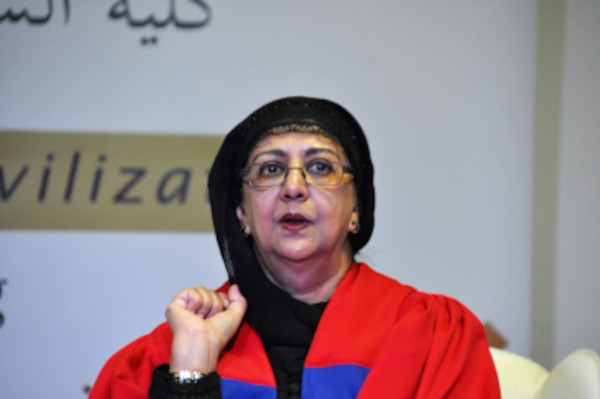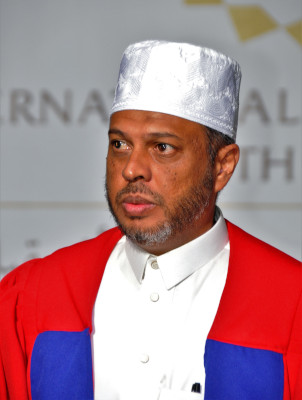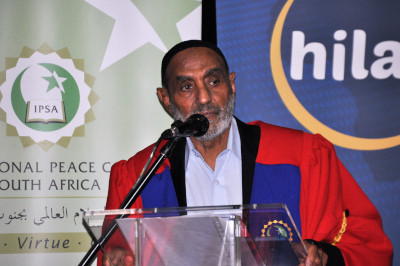IPSA directors handing over the Lifetime Achievement Award to Ismail A Kalla. From left to right, Nazier Osman, Ismail A Kalla, Abubakr Mohamed and Abdul Razack.
The International Peace College of South Africa (IPSA) held its postgraduate ceremony on Friday last week in the auditorium at Islamia College in Lansdowne, Cape Town. The Rylands-based college, established in 2005, has made great strides since its inception and expanded its programmes to include a master’s degree.
The celebration on 4 November was the graduation ceremony of the first cohort of students to successfully complete their master’s degree.
With the academic procession lining up in the foyer and making its way down the steps of the auditorium, the ceremony was opened and the graduation began. The master of ceremonies, Taj Akleker, welcomed all the esteemed guests and the entire auditorium stood for the National Anthem. Sheikh Ebrahim Gabriels, the head of the Da’wah Department of the Muslim Judicial Council (MJC), stood in for Sheikh Irafaan Abrahams, the MJC president of the MJC, to recite the opening prayer.
The official opening was conducted by IPSA chairperson Hafiz Advocate Abubakr Mohamed and followed by the keynote address delivered by Dr Shaheedah Essack, director at the Department of Higher Education.
Essack is responsible for ensuring that private higher institutions that qualify are registered and continue to comply with the regulations. She explains during the time when some public universities were closing down their theology faculties and departments, IPSA succeeded to register as an Islamic private higher institution making it one of the first Islamic colleges in the country.
 The keynote speaker Dr Shaheedah Essack, director at the Department of Higher Education.
The keynote speaker Dr Shaheedah Essack, director at the Department of Higher Education.
“I think this is a huge achievement because there were so many hurdles to overcome,” she said. Essack serves on the accreditation committee and knows what the challenges are first-hand. “To start an organisation from scratch and to build it up and to bring it to where it is today requires a great deal of commitment and sacrifice, and I think IPSA has done a great job.”
Looking at it broadly and in a more substantive way, a master’s degree enhances and deepens one’s understanding in any field, Essack said.
“In deepening your understanding of the discipline, it’s also an obligation whether we look at it morally, spiritually, educationally and economically. There is an obligation for that knowledge to be imparted to others and for that process to be sustained and sustainable.” A higher-level postgraduate degree prepares graduates for their chosen direction as well as there being a requirement for learners to give back to the community at various levels. This is where IPSA plays a big role.
Essack said the role that IPSA plays is linked to the historic legacy of the community who received teachings of Islam through the slaves brought to the Cape 350 years ago. These slaves overcame extraordinary challenges and obstacles and managed to establish Islam in the community. That very rich legacy should not be lost.
Following the keynote address, the BA honour’s degree certificates were conferred and thereafter the master’s degrees.
The college received its accreditation in 2013 and has enjoyed a positive trajectory, culminating in having all its programmes accredited and registered with the Department of Higher Education and Training.
The school has four fully accredited programmes. There are two undergraduate programmes, a higher certificate in Islamic Studies, ideal for matriculants taking a gap year when they are unsure about their future plans, says chief executive of IPSA, Dr Dawood Terblanche. The second programme is a more specialised three-year degree in Islamic Studies, majoring in Islamic law and Arabic.
 Dr Dawood Terblanche, chief executive of International Peace College of South Africa (IPSA).
Dr Dawood Terblanche, chief executive of International Peace College of South Africa (IPSA).There are also two postgraduate degree programmes. This year IPSA had 17 master’s degree graduates in Islamic Studies and six achieving their master’s degrees in Islamic Thought.
Since IPSA’s accreditation, the staff have been designing and developing new programmes to add to their bouquet of offering. A milestone for this boutique college is being the first fully accredited and registered private Islamic tertiary institution in South Africa. The founders recognised the need to cater for the Muslim community as well as professionals within the Muslim community and filled the void with the programmes they have established.
The next step is having a PhD degree to add to their list of options. The postgraduate department welcomes and makes it easy for students from diverse professional backgrounds to apply. “You can enter into the postgraduate programme with a qualification in, for example, law, engineering or medicine, so you get a solid foundation in various modules that will enhance your understanding of Islam,” says Terblanche.
A learning narrative of Islamic Studies in the form of prior classes that the students might have attended helps in getting their application accepted. The applicants would then need to write about their own journey and development of Islamic knowledge and once the portfolio is approved by the postgraduate department, they will be entered into the programme via the Recognition of Prior Learning (RPL) agreement.
The RPL for Islamic Studies is based on the informal studies that an applicant may have in addition to a mainstream professional degree. The master’s degree programme is structured over eight modules where students study an in-depth specialised knowledge of Islam. Once the students complete the eight modules, they are eligible to commence with a mini dissertation of between 25 000 and 30 000 words. The dissertation gets sent to external examiners. Once the external examiners review the thesis and all corrections are made, the students pass with a master’s degree in Islamic Thought.
Terblanche encourages students to pursue postgraduate degrees with IPSA as it helps students build themselves holistically.
Not only do they have people with traditional Islamic Studies degrees entering into a postgrad programme, but they have seen quite a few students from other mainstream disciplines. Those professionals are able to enhance what they are currently doing with an understanding of Islam.
This programme is built on the higher objectives of Islam which is the preservation of life, religion, intellect, honour and dignity.
“When they operate in their specialised fields, whatever that may be, they have a very solid and strong foundation of Islamic Studies to support what they are already doing within their discipline and field,” he said.
IPSA’s programmes are fully accredited and registered with the Department of Education so when a graduate comes from other Islamic institutions of learning they still have to go through a process to enter them into the NQF level 7, which is the undergrad level. With IPSA qualifications the students are already entered into the database.
“We are a bit ahead compared to what the other institutions are doing,” Terblanche said.
 Ismail A Kalla, the recipient of the IPSA Lifetime Achievement Award.
Ismail A Kalla, the recipient of the IPSA Lifetime Achievement Award.Prior to closing the graduation, the IPSA Lifetime Achievement Award was conferred to Ismail A. Kalla, one of the board members who served the institution for around 20 years, from when IPSA was known as the Islamic College Southern Africa (ICOSA).
Kalla said he had been caught off guard by receiving this award and was very pleasantly surprised. “It is always important to do the right thing … the acknowledgement is not important but I appreciate it,” he said.